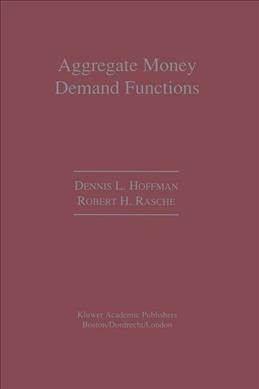| Aggregate Money Demand Functions: Empirical Applications in Cointegrated Systems Softcover Repri Edition Contributor(s): Hoffman, Dennis L. (Author), Rasche, Robert H. (Author) |
|
 |
ISBN: 9401073082 ISBN-13: 9789401073080 Publisher: Springer OUR PRICE: $104.49 Product Type: Paperback - Other Formats Published: September 2011 |
| Additional Information |
| BISAC Categories: - Business & Economics | Inflation - Business & Economics | Econometrics - Business & Economics | Economics - Macroeconomics |
| Dewey: 332.414 |
| Physical Information: 0.59" H x 6.14" W x 9.21" (0.87 lbs) 266 pages |
| Descriptions, Reviews, Etc. |
| Publisher Description: The econometric consequences of nonstationary data have wide ranging im- plications for empirical research in economics. Specifically, these issues have implications for the study of empirical relations such as a money demand func- tion that links macroeconomic aggregates: real money balances, real income and a nominal interest rate. Traditional monetary theory predicts that these nonsta- tionary series form a cointegrating relation and accordingly, that the dynamics of a vector process comprised of these variables generates distinct patterns. Re- cent econometric developments designed to cope with nonstationarities have changed the course of empirical research in the area, but many fundamental challenges, for example the issue of identification, remain. This book represents the efforts undertaken by the authors in recent years in an effort to determine the consequences that nonstationarity has for the study of aggregate money demand relations. We have brought together an empirical methodology that we find useful in conducting empirical research. Some of the work was undertaken during the authors' sabbatical periods and we wish to acknowledge the generous support of Arizona State University and Michigan State University respectively. Professor Hoffman wishes to acknowledge the support of the Fulbright-Hays Foundation that supported sabbattical research in Europe and separate support of the Council of 100 Summer Research Program at Arizona State University. |